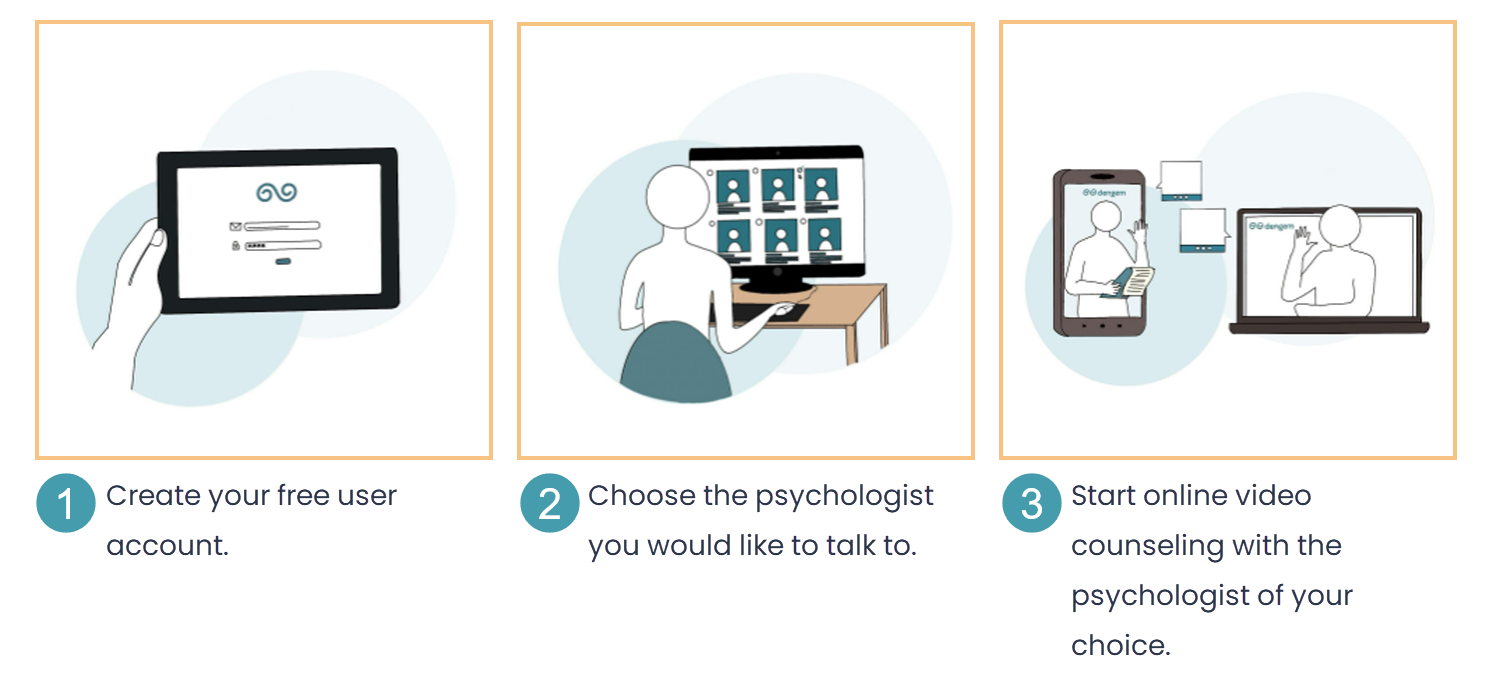
What to do about loneliness? Why do I feel lonely?
What is loneliness?
Loneliness is a common human experience that is deep and personal. Not only the lack of community, but also the lack of emotional connection and intimacy can lead to loneliness.
People can feel lonely in crowds or even in a relationship. This feeling can be triggered by various factors, such as bereavement, social isolation or lack of self-esteem. Loneliness is therefore a complex feeling that encompasses both the psychological and social dimensions of human life.
dengem's psychologists are just a click away and ready to help you in solving your problems.
What triggers loneliness and what causes it?
Loneliness research shows that the following factors are among the triggers of loneliness:
- Social isolation: This is the situation of being removed from social relationships and being alone. This situation is particularly common in old age and in difficult circumstances such as illness or poverty, and can trigger feelings of loneliness.
- Loss or separation: When a person experiences a loss, such as the death of a loved one, the departure of a friend or the end of a relationship. Such losses can trigger feelings of emotional loneliness.
- Emotional difficulties: A person may internalise loneliness and reduce their social connections. Conditions such as depression, anxiety or low self-esteem can trigger feelings of loneliness.
- Lack of communication: A person’s inability to communicate adequately or inadequate social skills can trigger feelings of loneliness. At the same time, a lack of communication can make it difficult for a person to communicate harmoniously with the people they interact with.
- Social factors: These include factors such as the culture, living conditions and social structures of the society in which the person lives. These factors can make it difficult for a person to form or maintain social relationships and can cause feelings of loneliness.

What to do about loneliness?
Loneliness is a natural part of life and it is normal for everyone to feel lonely from time to time. However, feeling lonely for a long time can lead to physical and mental health problems. This is why it is important to listen to what others have to say about loneliness. Here are some scientific suggestions on what a lonely person should do:
- Encourage social interaction: A lonely person can try different ways to encourage social interaction. They can join clubs or activities related to their hobbies or interests to meet new people. Volunteering is also a good way to socialise.
- Keep in touch with your immediate environment: A lonely person can alleviate feelings of loneliness by communicating with those around them. Getting together with family, friends or neighbours on a regular basis, or communicating by phone or the internet, can help reduce this feeling.
- Invest in yourself: Investing in yourself can boost your confidence and reduce feelings of loneliness. This includes activities such as exercise, healthy eating, meditation or yoga, reading books or learning something new.
- Seek help: Feelings of loneliness can be linked to mental health problems such as depression or anxiety. Seeing a therapist or counsellor can help lonely people cope with these feelings.
- Use digital connections: With advances in technology, a lonely person can improve their social interactions by using digital connections. This includes activities such as using social media platforms, joining online communities or playing online games.
Feeling alone is a situation that everyone faces from time to time, but persistent feelings of loneliness can lead to health problems. The suggestions above can help a lonely person reduce their feelings of loneliness and lead a happier life.

Loneliness in modern society: a serious unspoken problem
In our hyper-connected world, dominated by social media and digital communication, the idea that people can be lonely seems paradoxical. Yet it is a reality that many people face today. Modern society has created a lifestyle that, while seemingly enabling greater connectivity, can also contribute to loneliness.
The hustle and bustle of modern life and constant digital connectivity leave us with less time and opportunity to build healthy personal relationships. It is common for people to have hundreds of ‘friends’ on social media and still feel lonely and isolated. This is often because digital interactions are superficial and make it difficult to build deep relationships with others.
In addition, feelings of loneliness can be exacerbated by the pressure to compare oneself to the seemingly perfect lives of others on social media. This can lead to feelings of inadequacy and isolation, making loneliness worse.
Loneliness is an unspoken problem in modern society and can have serious consequences for mental and physical health. It is therefore very important that we take this issue seriously and find ways to combat loneliness.

15 Tips if you feel lonely.
Here are some things you can try if you feel lonely:
- Take time for yourself: Taking time for yourself can help you find inner peace. This could mean relaxing for a few hours, meditating, doing yoga or just sitting in a quiet place.
- Socialise more: Increasing your social contact is important to reduce feelings of loneliness. You can join clubs or attend events related to your hobbies or interests to meet new people.
- Stay in touch with loved ones: You can reduce feelings of loneliness by keeping in touch with your loved ones. Spending time with family, friends or neighbours on a regular basis, or communicating by phone or internet, can help reduce feelings of loneliness.
- Invest in yourself: Investing in yourself can boost your confidence and reduce feelings of loneliness. This includes activities such as exercising, eating well, reading a book or learning something new.
- Take advantage of digital opportunities: Thanks to technological developments, lonely people can improve their social interactions by taking advantage of digital opportunities. This includes activities such as using social media platforms, participating in online communities or playing online games.
- Creative activities: Creative activities can help a person to express themselves and overcome loneliness. This can include activities such as painting, listening to or playing music, writing or crafting.
- Spending time in nature: Spending time in nature can help relieve stress and find inner peace. This includes activities such as hiking, picnicking or camping.
- Spending time with animals: Spending time with animals can help reduce stress and feelings of loneliness. This includes activities such as having a pet, volunteering at an animal shelter or visiting the zoo.
- Talk to yourself: Talking to yourself can help improve your inner dialogue and reduce feelings of loneliness. This includes activities such as sending yourself positive messages, thinking about problems or keeping a journal.
- Challenge yourself: Challenging yourself can help improve and reduce feelings of loneliness. This includes activities such as learning a new skill, setting a goal or doing a challenging exercise programme.
- Setting a goal: Setting a goal can help improve and reduce feelings of loneliness. This includes activities such as setting a goal, looking for a job or volunteering.
- Read self-help books: Reading self-help books can help you find your way and reduce feelings of loneliness. This includes activities such as reading books on topics such as personal development, motivation or psychology.
- Reward yourself: Rewarding yourself boosts self-motivation and morale, and helps alleviate feelings of loneliness. This includes activities such as buying a gift, eating a favourite meal or taking part in an activity.
- Remember to laugh: Remembering to laugh can relieve stress and distract from feelings of loneliness. This includes activities such as watching comedies or TV shows, laughing with friends, or telling funny stories.
- Therapy: Another way to combat loneliness is through therapy. Talking to a therapist can help you develop strategies to understand and manage your feelings of loneliness.
These suggestions are some research-based options that people who feel lonely should try. However, everyone has different interests and needs, so it is important to choose activities that suit you.
References:
- Cacioppo, J. T., & Cacioppo, S. (2018). The growing problem of loneliness. The Lancet, 391(10119), 426.
- Jeste, D. V., Lee, E. E., & Cacioppo, S. (2020). Battling the Modern Behavioral Epidemic of Loneliness. JAMA Psychiatry, 77(6), 553. https://doi.org/10.1001/jamapsychiatry.2020.0027. Feeling lonely
